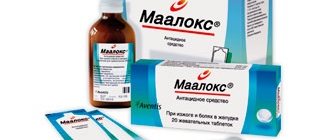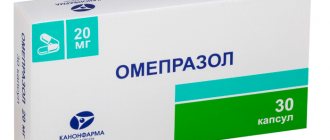Omeprazole description of the drug
Externally, Omeprazole looks like a crystalline white powder. According to its chemical structure, it belongs to benzimidazole derivatives. It has a weak alkaline reaction, dissolves well in alcohols and very poorly in water. Omeprazole is a prodrug. This means that the substance contained in it does not have healing properties in itself, but acquires these properties after entering the internal environment of the body.
Omeprazole is a prodrug, which means that the substance contained in it does not have healing properties in itself, but acquires these properties after entering the internal environment of the body
Dosage forms of Omeprazole - tablets, capsules, powder for the preparation of solution for intravenous administration. Capsules can have a dosage of 10 and 20 mg, tablets - 10, 20 and 40 mg. The powder comes in 40 mg bottles.
The effect of the drug occurs quite quickly - within 1 hour and lasts about 23 hours. Omeprazole 20 mg reduces the pH level in the stomach to a value of 3 and maintains it at this level for approximately 17 hours. During the course of treatment at a dose of 20 mg daily, the maximum effect is achieved on days 3-4. After the course, the effect lasts for several more days. The medicine can be prescribed to adults and children starting from 5 years of age. Elderly patients can take omeprazole without dose adjustment.
It is recommended to take Omeprazole before or during meals, preferably in the morning. Take the medicine with a small amount of water. When using Omeprazole in capsule form, they should not be chewed. The usual dosage is 20 mg per day for 1 dose. However, in some cases, for example, with resistance to antiulcer drugs, it can increase to 40 mg.
The duration of treatment and method of application depend on the disease. For peptic ulcers, the course of treatment usually lasts 4 weeks, for gastritis and heartburn - 2 weeks. It is not recommended to use the drug for more than 2 months. With a long course of treatment, a break of several months should be taken. When prescribing Omeprazole, the instructions for use can be adjusted by the doctor depending on the circumstances.
Omeprazole in the treatment of gastritis
Omeprazole is one of the most popular and affordable medications that is used for various types of acute and chronic gastritis. It is over-the-counter, meaning you do not need a prescription from your doctor to purchase it.
However, this does not mean that this medicine can be used for self-medication without appropriate examination. It, like all others, has a number of limitations and contraindications, and before using it for the first time, you should carefully read the instructions for medical use. The drug is available in the form of tablets with a dose of 10, 20 and 40 mg and a solution for intravenous administration (40 mg of the drug in one ampoule). The dose and frequency of administration are selected by the doctor individually.
Omeprazole is one of the most popular and affordable medications that is used for various types of acute and chronic gastritis
The drug is effective for about a day, however, in case of exacerbation of gastritis or acute form, this is not enough and double use is necessary. Intravenous forms are also indicated in severe cases and if oral administration is impossible or severely difficult. At the first opportunity, the patient is transferred to tablets.
The main indication for the use of omeprazole for gastritis is the presence of confirmed increased acidity in the stomach or other acid-related diseases. At a low or normal pH level, it can cause complications or the appearance of dyspeptic disorders.
The drug is contraindicated in children under 18 years of age, however, there are various individual exceptions to this rule. It changes the metabolism of many drugs, which begin to dissolve in the stomach, so you should discuss this issue with your doctor before starting therapy.
Also, those who suffer from polyvalent allergies, severe liver and kidney diseases should not self-medicate. Pregnant and nursing mothers can use it, but under medical supervision. It is important that omeprazole is included in the regimen for eradicating or eliminating the bacterium Helicobacter pylori along with other antibacterial drugs. Therefore, its role in the treatment of gastritis is very great.
Instructions for use of the drug Omeprazole in the treatment of gastritis
After a mandatory consultation with a gastroenterologist, who will determine the required daily dose of the drug, the information provided by the pharmaceutical manufacturing company will be useful for review.
Before taking Omeprazole, it is vitally important to ask a specialist whether he recommends taking the medicine, and if there are no contraindications, then follow the dosage prescribed by the doctor. Half an hour before meals, one capsule per day is recommended for pain relief for those who have an exacerbation of duodenal ulcer. In particularly difficult cases, the doctor will be able to double the daily dose, but in any case, the duration of the course of treatment with Omeprazole will be four weeks.
The course will be half as long in duration for the treatment of gastritis, bloating, and discomfort after eating. You will have to take capsules, like some other heartburn medications, according to the same scheme: one half an hour before meals.
In particularly difficult cases, the doctor will be able to double the daily dose, but in any case, the duration of the course of treatment with Omeprazole will be four weeks
In case of inflammation of the esophageal mucosa, on the contrary, the course of administration will increase to two months, and the capsules will have to be taken twice a day. For prevention or during rehabilitation after serious illnesses caused by intestinal infections, this drug is not recommended to be taken at night, only four hours before bedtime.
Omeprazole, which has other names (omez, ultop, gastrozole), is a capsule in a soluble shell. They must be swallowed whole, without chewing, so it is allowed to take the medicine with a sufficient amount of liquid. According to the manufacturer's instructions, this should be done before meals, preferably half an hour before. Regardless of the reason for which the next dose of medication may have been missed, it is strictly not recommended to double the next dose taken.
The duration of the course will be determined by the doctor, based on the severity of the disease, clinical tests, and the characteristics of the course of treatment. The average duration of taking the medicine as described by the manufacturer is four weeks. For some mild inflammations, the course prescribed by the doctor will be halved, and for severe forms, you will have to take the medicine for about two months.
Dosage and rules for taking Omeprazole for gastritis
The dosage and duration of treatment with Omeprazole should be determined by the doctor depending on the type of disease (the drug is prescribed only for gastritis with high acidity), the severity of the patient’s condition, his age and characteristics of the body.
The drug is available in the form of tablets, capsules or powder for dissolution. One capsule already contains the optimal daily dose (20 mg of the drug), so it is enough to take a tablet or capsule before your first meal.
There are certain rules for taking Omeprazole that will allow you to take it with maximum benefit:
- tablets and capsules should be swallowed whole, not crushed, chewed or dissolved: the course of treatment for acute gastritis lasts no more than 2 weeks. It is not recommended to take the drug continuously without a doctor's prescription. The course of treatment can only be extended by a doctor if necessary;
- Omeprazole can be combined with other drugs: if the cause of gastritis is the bacterium Helicobacter pylori, antibiotics are prescribed simultaneously with Omeprazole. The break between doses of drugs should be at least an hour. You cannot take all the pills at once, in one handful, they will not be effective enough;
- It is enough to take omeprazole once a day, this dosage will be effective throughout the day (24 hours), increasing the dose on your own is not recommended. The doctor may increase the dosage to 2 or 3 capsules per day only if indicated;
- When taking the drug correctly, the maximum concentration of the drug in the cells is achieved 4-5 days after the start of administration. The drug continues to act after discontinuation for a week.
Omeprazole should not be taken uncontrolled, without a diagnosis and prescription from a doctor, as well as for prevention. The drug has side effects. You should also not abruptly interrupt the course of treatment with Omeprazole or take it occasionally. This will significantly reduce its effectiveness and lead to relapse of the disease.
Contraindications
Omeprazole is a specific medicine, the improper use of which can cause serious harm. Therefore, it is imperative to know what contraindications for use exist. Prescribing the drug is unacceptable:
- If you suspect cancer. The drug changes the gastrointestinal tract, which makes it difficult to make an accurate diagnosis.
- In the presence of infectious and viral lesions of the digestive system that are not associated with Helicobacter pylori infection. The drug may create a favorable environment conducive to the proliferation of pathogenic organisms. Additionally, it may be taken in combination with specific antibiotics.
- For liver failure. After biological transformation in the gastrointestinal tract, the drug can cause inflammation.
- In case of renal failure. The medicine in such a situation will not be completely eliminated, so there are risks of intoxication.
Omeprazole is also not prescribed to children under 12 years of age and pregnant women. It is not advisable to carry out treatment with the drug during lactation. In addition, capsules should not be taken if you have an individual intolerance to the components.
How to take Omeprazole for gastritis
When taking the standard dose recommended in the instructions - 20 mg, after 1 hour a pronounced antisecretory effect appears, stomach pain is reduced and other unpleasant symptoms of gastritis disappear. The maximum effectiveness of the drug occurs 2 hours after administration and for another 24 hours after taking a single therapeutic dose; omeprazole blocks up to 50% of synthesized hydrochloric acid.
The use of omeprazole for gastritis must be approved by the attending physician. Despite the safety and effectiveness of the drug, only a qualified specialist will be able to assess the appropriateness of its prescription, indicate the exact doses, mode of administration and duration of the course of administration. To treat gastritis, use tablets or capsules, swallowing them whole, without chewing, and drinking a small amount of water.
It should be taken at least an hour before meals. It is better to do this in the morning before breakfast. The usual dosage of the drug for the treatment of gastritis is 1 capsule or tablet per day, which corresponds to 20 mg of omeprazole. If this dose of the drug does not produce the desired result, then it can be increased to 40 mg.
For the treatment of acute gastritis, taking the medicine for two weeks is usually sufficient. If necessary, it can be continued for another 2 weeks. Gastritis caused by Helicobacter pylori requires additional therapy with antibacterial agents. Clarithromycin and amoxicillin are most often used for this purpose, but other drugs may be prescribed at the discretion of the attending physician.
How to take Omeprazole for gastritis
Before taking the medicine, you should consult a doctor who will help you choose the dosage and prescribe a course of treatment. The specialist will take into account the form of gastritis, condition, characteristics of the body, and the patient’s age. The medicine is available in the form of tablets, dissolving powder and capsules. One capsule contains the required daily requirement - 20 mg.
There are rules on how to drink Omeprazole for gastritis:
- the course lasts 14 days, it can only be extended by a specialist;
- combined with other medications: often, if the disease is caused by Helicobacter pylori, the patient is prescribed antibiotics. In this case, the break between medications should be about one hour;
The dosage in the Omeprazole tablet is enough for the acidity level to begin to fall an hour after taking it
- Capsules and tablets are taken whole and should not be dissolved;
- Abrupt interruption of the course is prohibited, this leads to its ineffectiveness and can cause a relapse of the disease;
- the drug is used once a day, since the available dosage in a tablet or capsule is sufficient for effective treatment throughout the day;
- The maximum concentration with proper use is achieved after at least four days, so the dose should not be increased without the doctor's permission.
Before the first meal, doctors recommend using Omeprazole in case of illness or exacerbation of gastritis. A course can be called effective only after the patient’s complaints about the gastrointestinal tract disappear. The dosage in the tablet is enough so that the acidity level begins to fall an hour after taking it. It is worth noting that the effect of the medicine during the day slows down the production of hydrochloric acid by half. The final withdrawal of the drug from the patient’s body occurs 5–10 days after stopping the course.
Side effects
If you follow all the doctor’s recommendations, side effects are extremely rare. Minor nausea and headache may occur in the first few days. As a rule, the condition returns to normal after a couple of days. If discomfort does not disappear, then the treatment regimen must be adjusted.
If Omeprazole is used incorrectly, serious side effects are observed. A number of exacerbations may occur in the gastrointestinal tract, the cause of which is the drug. Among them:
In difficult situations, digestive system disorders are accompanied by the patient’s emotional instability and depression. If treatment is carried out against the background of liver failure, then over time the risk of hepatitis and encephalopathy increases.
Allergic reactions due to individual intolerance often manifest as rashes, itching, swelling or hair loss. With prolonged use, there is a risk of developing cystic formations on the walls of the digestive organ.
If any adverse symptoms occur, the drug should be discontinued. As a rule, Omeprazole in such cases is replaced with analogues that have a more gentle effect.
Precautions when treating gastritis with Omeprazole
Omeprazole-based drugs are used only as prescribed by a doctor, according to the treatment regimen prescribed by a specialist. Under no circumstances should you start taking the drug on your own, without a preliminary examination and diagnosis by a specialist.
Omeprazole will alleviate the current condition by reducing painful symptoms by regulating the secretory function of the stomach, but will thereby complicate correct diagnosis in the presence of cancer, the symptoms of which (like peptic ulcers) are almost identical to the clinical manifestations of gastritis.
For gastritis, one tablet of omeprazole (20 mg of active substance) per day is usually enough to reduce the increased production of gastric juice. But if the patient misses the next dose of the medicine, there is no need to take a double dose next time, this can lead to a worsening of the condition. In this case, adjustments to drug treatment should only be made by a specialist.
Liver or kidney failure is not a disease for which it is contraindicated to take drugs containing omeprazole. But doses for elderly, weakened patients should be selected individually. With the usual dosage regimen, an overdose of this drug may occur due to increased bioavailability caused by impaired renal and liver functions.
Today, there are a large number of analogues of Omeprazole drugs, so before using the medicine, carefully read the instructions: the content of the active substance in 1 capsule (tablet) may vary.
Contraindications
Before using the tablets, you must study the instructions for use, which list a number of contraindications. It is unacceptable to carry out treatment with Omeprazole in cases of individual intolerance to one of the components of the drug.
The main contraindications include:
- The first months of pregnancy. Taking the drug can lead to developmental defects in the baby. During this period, the advisability of taking Omeprazole should be decided by the attending physician.
- Lactation period. The active components of the drug pass into breast milk.
- With a reduced level of acidity of gastric juice and atrophic gastritis, it is better to be treated with another medication, since the active component of Omeprazole sharply reduces the level of acidity.
- Oncology of the digestive system. A medication that eliminates symptoms complicates the process of establishing a diagnosis. In addition, experts say that the active components of the drug stimulate the growth of existing tumors.
- The presence of osteoporosis and a tendency to spontaneous bone fractures. Considering that when taking the drug, the process of leaching calcium from the body is accelerated, the manifestation of osteoporosis only intensifies. In case of urgent need to take this inhibitor, it is important to additionally take calcium and vitamin D.
How can you replace Omeprazole in the treatment of gastritis?
In case of individual intolerance to the drug, it can be replaced with an analogue recommended by the doctor. Omeprazole analogues also reduce the acidity of gastric juice and help relieve inflammation of the gastric mucosa.
Omeprazole replacement drugs for the treatment of gastritis:
- Omez: a drug based on omeprazole, often prescribed for inflammatory diseases of the stomach and duodenum. This is an Indian-made drug; it is available not only in tablets, but also in injections. Side effects include nausea, abdominal pain, constipation or diarrhea, arrhythmia, allergic reaction, drowsiness;
- Orthanol: This drug also contains omeprazole and has a relatively low price, but differs in that the maximum concentration of the drug is reached over a longer period of time;
- Rabeloc: a drug based on rabeprazole, available in the form of tablets and solution for injection. Not recommended during pregnancy, breastfeeding, or individual intolerance to the drug;
- Ontime: the drug contains rabeprazole, but of all analogues it has the lowest ability to penetrate tissue (bioavailability). Recommended for hyperacid gastritis, gastric ulcers and erosion, GERD, as well as in combination with other drugs for the eradication of Helicobacter pylori. The drug is not used in pediatric practice and is extremely rarely prescribed to children;
- Gasec: a drug based on omeprazole. The maximum effect is observed on the fourth day after starting treatment. Available in capsule form for oral administration. The drug Gasec-10 is taken 1-2 capsules per day. The drug is not recommended for people with fructose intolerance.
All of the drugs listed contain either omeprazole or rabeprazole. In case of severe side effects while taking omeprazole, they are replaced with more gentle drugs that envelop and protect the walls of the stomach: Reni, Gastal, Almagel, Maalox.
Sources:
- https://med.vesti.ru/articles/lekarstva-i-preparati/omeprazol-instruktsiya-po-primeneniyu-pokazaniya-pobochnye-dejstviya-i-sostav/
- https://blog.mednote.life/articles/medication/omeprazol-pri-gastrite
- https://sovets.net/3845-omeprazol-chto-lechit-kak-prinimat.html
- https://gigiena-center.ru/mozhno-li-prinimat-omeprazol-pri-atro.html
- https://gastritinform.ru/gastromedic.ru/gastrit/omeprazol-primenenie-pri-gastrite.html
- https://zhkt.ru/preparaty/omeprazol-pri-gastrite.html
- https://pobedigastrit.ru/lekarstva/kak-pravilno-prinimat-omeprazol-pri-gastrite.html
- https://vernizdorove.ru/gastrit/omeprazol-pomozhet-li-pri-gastrite.html
Side effects
Side effects during treatment with Omeprazole are extremely rare. Side effects may occur if the inhibitor is used incorrectly or for a long time (more than 60 days). In such cases, side effects such as stool upset, a feeling of heaviness in the abdomen, attacks of nausea, dizziness, and headache may occur.
There may also be vomiting, a feeling of dryness in the mouth and the development of inflammation of the oral mucosa, impaired liver function, depression, increased irritability, lethargy and apathy, encephalopathy (occurs extremely rarely when taking Omeprazole), rashes on the skin, red spots on the hands and face.
The list of side effects continues with skin peeling, exudative erythema, increased sensitivity to light, partial loss of hair, elevated body temperature, urticaria or Quincke's edema, bronchial muscle spasm, interstitial nephritis, anaphylactic shock.
While taking an inhibitor, changes in the blood may occur, namely, the level of leukocytes and platelets will decrease, and anemia will develop. Pain in the muscles and joints may occur, and muscle weakness may be felt.
It is extremely rare that visual acuity may decrease, swelling of the lower extremities may appear, the mammary gland will enlarge, or a glandular cyst may form in the digestive system, both benign and malignant.
Omeprazole effectively fights gastritis and eliminates heartburn











